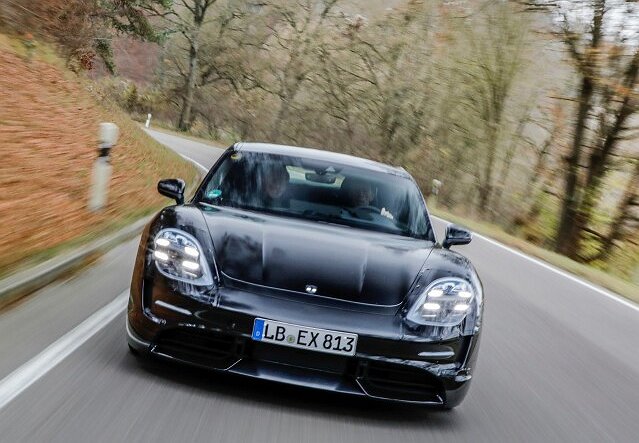Porsches traditionally were air-cooled and rear-engined, and purists still prefer them that way today. The company had to endure groans and moans when it produced a car with both a front engine and water cooling in the 928 of 1978. Further protests accompanied the Cayenne, an SUV, in 2002. Of course, the Cayenne and another SUV, the Macan, have since become Porsche’s best-selling U.S. models by far. It’s why every performance automaker that swore it would never produce SUVs is now producing SUVs (except McLaren).
But now Porsche is going electric with the 2020 Taycan (pictured at top), and that’s another big change. Olivier Humpert (pictured below), the company’s Director for Exterior Procurement, says that eventually every Porsche model will have an electric makeover, probably ending with the just-introduced Carrera, the latest variant of the sacrosanct 911 (introduced in 1963).
Humbert was at Michelin’s “Movin’ On” green mobility conference in Montreal June 5 to help bring the brand into the sustainability universe. He
“Brand value adheres to one’s emotional response and social acceptance,” Humpert said. “It’s historically a combination. Because of global regulation, we think that our future lies in e-mobility, and we have to work on the social acceptance part of the equation.”
Because electric vehicles are inherently zero emission, Porsche is choosing to reduce emissions that will still be occurring in its supply chain. According to Humpert, Porsche is working on mandatory sustainability ratings for each of its 7,600 suppliers. They’ll listen, because Porsche produces 250,000 cars a year and pays those suppliers 10 billion euros annually.
“We will do more on purchasing, and also on buying green energy,” he asserted.
On the other hand, no one will buy an electric Porsche if it doesn’t deliver where the tires hit the pavement. Selling electric cars on green alone hasn’t worked out too well. Most Tesla buyers have other things in mind. The dual-motor, 600-horsepower Taycan, luckily, can reach 62 miles per hour in less than 3.5 seconds, hit 155 mph, and has a range of 310 miles. Humpert said it can reach 80 percent of charge in 30 minutes, via a new Level 3 network the company is building.
“Our goal is to let people drive the car and see that it is very much a true Porsche, with the speed and performance they have come to expect,” Humpert explained. “Electric cars can be very fun to drive.” The company hasn’t revealed its advertising strategy for the Taycan, but it’s safe to say it will concentrate on convincing buyers that an electric Porsche is still a Porsche.
Porsche has created experience centers in Atlanta and





